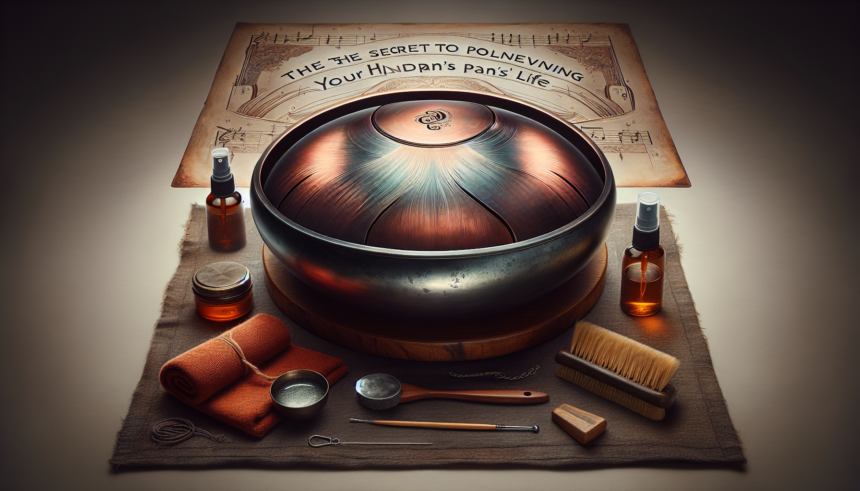The handpan, a captivating and melodious instrument, has gained immense popularity over the past decade. Originating from the Swiss company PANArt in the early 2000s, its ethereal sound has enchanted musicians and listeners alike. However, like any finely crafted musical instrument, a handpan requires diligent care to ensure its longevity. In this article, we will delve into the various practices and steps that can help you prolong the life of your precious handpan.
1. Regular Cleaning
One of the foremost steps in maintaining your handpan is regular cleaning. Dust, sweat, and oils from your hands can accumulate on the surface, potentially causing corrosion or tarnish over time. Clean your handpan after every playing session using a soft cloth. For deeper cleaning, you can use a slightly damp microfiber cloth followed by a dry one to avoid any moisture retention.
Additionally, there are specialized metal cleaners and oils designed for handpans. A light application of oil, like Phoenix Handpan Oil or Froglube CLP, can prevent rust and maintain its sheen. Ensure you follow the manufacturer’s guidelines for application and frequency.
2. Proper Storage
Proper storage is crucial to prolonging the lifespan of your handpan. Ensure that your storage environment is cool, dry, and free of excessive humidity. High moisture levels can expedite rust formation, especially if you live in a coastal area. If possible, store the handpan in a padded soft case or hard case specifically designed for it. These cases offer protection from physical damage and also shield the instrument from environmental factors.
3. Safe Transportation
Given their unique shape and delicate nature, handpans can be prone to damage during transport. Always use a well-padded case when moving the instrument. If you’re traveling long distances, consider investing in a hard case with robust outer shells and ample internal padding. When packing the handpan, ensure it is snugly fit within the case to prevent any movement that could lead to scratches or dents.
For air travel, it’s advisable to carry the handpan as hand luggage if possible, to avoid the rough handling that often occurs with checked baggage.
4. Handling with Care
Handpans are not only musical instruments but also delicate pieces of art. Always handle your handpan with clean hands to minimize the transfer of oils and dirt. Be mindful of your surroundings while playing, avoiding rough surfaces and crowded areas where the handpan could accidentally get knocked or scratched.
Avoid placing objects on top of the handpan, as unnecessary weight can distort its shape and disrupt its sound quality. When not in use, place your handpan on a stable surface with a soft base or keep it in its protective case.
5. Periodic Tuning
Over time, the pitch and tone of your handpan may alter due to regular playing and environmental factors. Periodic tuning by a professional is essential to maintain its pristine sound quality. Most makers recommend tuning every one to two years, depending on usage. If you notice any discrepancies in the sound or if the notes start to sound off, it’s time to consult a handpan tuner.
Professional tuning not only restores the original sound but also allows for a thorough examination of the handpan by an expert who can address any minor issues before they evolve into major problems.
6. Environmental Adaptation
Handpans are sensitive to environmental conditions and can expand or contract with temperature changes. To protect it, avoid exposing the handpan to extreme temperatures, whether hot or cold. Sudden shifts in temperature can cause the metal to contract or expand rapidly, leading to potential damage. If you play outdoors, try to choose moderate weather conditions and avoid direct sunlight exposure for prolonged periods.
When indoors, maintain a stable environment with consistent temperature and humidity levels to ensure the instrument remains in peak condition.
7. Regular Inspections
Regular inspections can help identify potential issues before they become significant problems. Examine your handpan periodically, looking for signs of rust, corrosion, dents, or changes in sound. Addressing these issues promptly can prevent further deterioration and ensure the instrument’s longevity.
Besides manual inspections, consider professional evaluations. Experts can detect and fix issues that might not be apparent to an untrained eye, helping to maintain the instrument’s integrity and performance.
Conclusion
Maintaining a handpan is a blend of consistent care, proper handling, and periodic professional attention. By following the outlined practices—regular cleaning, safe storage, careful transportation, respectful handling, periodic tuning, environmental adaptation, and regular inspections—you can significantly extend the life of your handpan. As a result, this remarkable instrument will continue to deliver its resonant, soothing melodies for years to come.
Remember, the handpan is not just an instrument; it’s a companion in your musical journey. Treat it with the respect and care it deserves, and it will reward you with endless hours of soulful music.
Frequently Asked Questions (FAQs)
- 1. How often should I clean my handpan?
- It is advisable to clean your handpan after every playing session to remove any sweat, oils, or dust. Use a soft microfiber cloth for regular cleaning and a slightly damp cloth followed by a dry one for a deeper clean.
- 2. Can I use any oil to clean my handpan?
- No, it’s recommended to use specialized oils designed for handpans like Phoenix Handpan Oil or Froglube CLP. These oils help prevent rust and maintain the instrument’s sheen without causing damage.
- 3. How should I store my handpan?
- Store your handpan in a cool, dry place free from excessive humidity. Use a padded soft case or hard case to offer protection from physical damage and environmental factors. Ensure the storage environment is stable to prevent stress on the metal.
- 4. What should I do if my handpan sounds off-tune?
- If your handpan sounds off-tune, it’s best to consult a professional tuner. Most handpan makers recommend tuning every one to two years, depending on usage. A professional tuner can restore its sound quality and examine it for any potential issues.
- 5. Can I travel with my handpan as checked luggage?
- It is highly recommended to carry your handpan as hand luggage if possible. The rough handling of checked baggage can cause significant damage. If you must check it in, use a robust hard case with ample internal padding to minimize the risk of damage.





